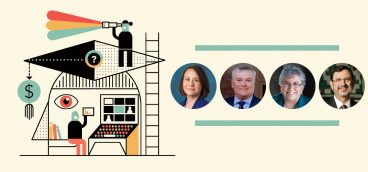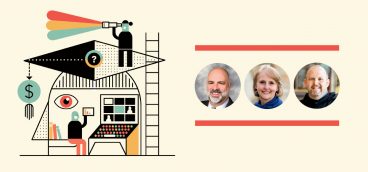A few months ago, as graduates donned caps and gowns and set their sights on their futures, parents snapped pictures of the end that marked the beginning
The day after, however, graduates facing an uncertain future wondered, “Will I get a job?”
The good news for recent college graduates is that 19 percent more of them will be hired this year than last year, according to a National Association of Colleges and Employers (NACE) survey. So which majors are more likely to land those jobs?
Statistics indicate that, if you study a practical major, you’ll find a job. Business, engineering and computer science bachelor degrees were on the “Most Wanted” list for employers hiring from the college class of 2011. And in June, NACE released the top 10 fields where employers offered the most jobs: accounting services, engineering services, consulting services, retail/wholesale trade, financial services, petroleum & coal products, banking (investment), educational services, government (federal) and computer systems design/consulting/ programming.
Regardless of the facts and the economy, however, students are not choosing majors based solely on getting a job, said Edwin Koc, director of strategic and foundation research at NACE. “The most popular majors are business administration, political science, education and psychology.”
However, even with a specific and practical major, landing a job in that field is no simple matter. “Students who major in sports management and expect to get a job with the Steelers or Penguins, or who major in elementary education and expect to get a teaching job with their local school district are likely to find that these jobs are extremely competitive,” said Rhonda Gifford, director of career services at California University of Pennsylvania.
Currently, education is the most difficult major to translate into a job, said Koc. “Less than 20 percent of those who have applied for teaching jobs received a job offer. English is also a degree that students are having trouble getting a job with, due to how many students go into teaching at the elementary or secondary levels. Jobs are on hold because of the budget crunch on public schools.”
All sorts of factors contribute to a student’s choice of a major. The primary ones are the job market, personal values and the influence of peers and mentors. “Those who are less practically oriented choose their dream major,” said Cal U’s Gifford. “And some students choose a major based on their perception of a career portrayed on a television show! We call this the ‘CSI’ phenomenon,” she said, referring to a surge in justice studies majors when the television show “CSI (Crime Scene Investigation)” became popular.
Many colleges have implemented requirements that keep students from putting all their eggs in what may be an impractical basket, and to help them become more marketable. Allegheny College, for instance, requires a major and a minor that are not in the same division. “A few years ago, one of Allegheny’s strongest pre-med students graduated with an English/creative writing major,” said Michaeline Shuman, Allegheny’s director of career services. “He minored in the sciences, which gave him the prerequisites needed for med school, but he stood out in a uniquely positive way and has been very successful in med school thus far.”
What the boss wants
Employers have become much more interested in students with internship and job experience. About 55 percent of recent college grad hires had applicable internship experience, NACE figures show. And 75 percent of employers prefer students who have work experience in a related field. Having a paid internship experience increases a student’s number of job offers significantly, said Koc. “On the other hand, participating in unpaid internships hasn’t shown an increase in the amount of job offers.”
Internships and job shadows also give students an idea of what’s to come. Simply learning the rigors of 9 to 5 has its own value, especially considering that many students have irregular class and work schedules. “Most students are unprepared for the typical work day,” said Patrick Beymer, a senior economics major at Pitt. “That alone takes time to get used to.”
Whatever their major, students are pressed to become well-rounded and to hone a variety of skills rather than just one. “Employers are looking for team-players, students with personal skills,” said Rob Hackett, a University of Pittsburgh senior majoring in studio arts and minoring in economics. This includes internships, communications and problem-solving skills, a strong work ethic, willingness to relocate, and effective job search strategies, such as personal networking, said Gifford at Cal U. And a student with those skills and, for instance, a sociology major, will likely find a job sooner than someone with a high-demand major who doesn’t possess those qualities or job experience.
“Employers’ expectations have increased,” said Nicole Feldhues, director of career services at Duquesne University. “They expect a higher level of skills.” According to NACE surveys, the top five skills employers seek are verbal communication, strong work ethic, teamwork, analytical ability, and initiative.
Factoring in the economy
With national unemployment remaining above 9 percent, job anxiety is high, and parents and students are asking for more statistics on the marketability of certain majors. But are students actually choosing practical majors over their dream majors? Not necessarily. “From reported anecdotal evidence, students have not been choosing their majors based on the economy,” said Farouk Dey, director of career and professional development at Carnegie Mellon University. “They are still choosing majors based on their passion.”
Whether one chooses a practical major over a dream major may also be a matter of economic circumstance. For instance, Pitt senior Beymer believes more of his fellow students chose majors to get a job, especially given the slow economy and mounting debt. And at Carlow University’s Career Center, Director Cynthia Smith concurred: “Students are feeling the pressure from the economy to choose something with higher salaries and more jobs available.”
Given the relatively moribund economy, still others are rethinking the value of practicality altogether. “I think the outlook is pretty grim,” said Pitt senior Hackett. “If we’re not going to get a job anyway, we might as well major in what we want.”
For students concerned about finding a job, there’s always graduate school. At Allegheny College, about 45 percent of the graduating class goes straight into graduate or professional programs. And in terms of increased earning power, graduate school has a proven payoff. Many students believe graduate school is their only option in today’s economy. “Students ride out the economy by furthering their education,” said Roberta Cross, director of career services at Washington and Jefferson College. “They take the next step hoping the economy will improve.”
The best advice
Whether it’s the best of times, the worst of times, or both, the old story hasn’t changed, many experts say. Choose what you love and think about how to make it practical. Then, try to get internships and part-time jobs related to your field.
“A major doesn’t have to equal a career,” said Carnegie Mellon’s Dey. “Sometimes academic disciplines that are less practical are difficult to translate into a career path. So students need to think about their passions, interests and other skills they have learned from their college experience.” Students who have been active in student organizations, gained leadership experience and taken part in internships find jobs.
Go to job fairs and meet prospective employers face-to-face, instead of just electronically. And use your career services department. Finally, don’t worry too much. According to NACE surveys, employers do 64 percent of their entry level hiring in the fall.




